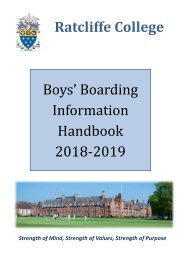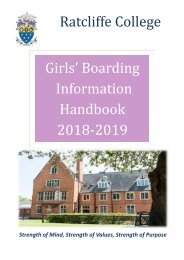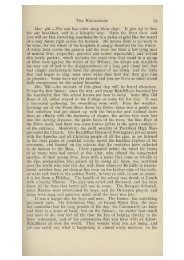Ratcliffe-College-Key-Stage-3-Handbook-2016-2017
You also want an ePaper? Increase the reach of your titles
YUMPU automatically turns print PDFs into web optimized ePapers that Google loves.
Drama<br />
What you will study:<br />
In Year 7 the work starts with the training of mime skills, and these include<br />
movement, gesture, body language and facial expression. These are vital tools in<br />
conveying characters, feelings and emotions. The voice work is then developed<br />
with vocal exercises and script reading. Use of pitch, tone, pace and timing are<br />
also important to enable these characters to come to life. You will finish the<br />
year with a short presentation of your work.<br />
In Year 8 script work is now developed to include writing your own scripts where<br />
you will be asked to think about a number of issues such as homelessness or<br />
being alone. The strategies and techniques learnt in Year 7 will be incorporated<br />
within these scripts and performed during class lessons. The devising process<br />
will be more challenging and be a combination of scripted and improvised work.<br />
You will also study a Shakespeare play using a variety of dramatic techniques to<br />
explore characters and themes. Script work or a full length play, where you have<br />
to interpret characters through voice and movement, will be the final<br />
presentation of the year.<br />
In Year 9 you will look at presenting Drama in different forms and medium, i.e.<br />
television, pantomimes, global issues such as bullying, terrorism, war etc. Stimuli<br />
from photographs, films, poetry and scripts will be used in this context. This will<br />
involve research, developing a script, rehearsing and performing. This will bring<br />
you to an understanding of history, as well as broaching subjects that are<br />
relevant to our times. You will create and design your own pantomimes for<br />
performance to the Junior School. You will also study a full length script and<br />
interpret characters through voice and movement techniques as well as using<br />
staging strategies learnt in Years 7 and 8.<br />
Teaching approaches:<br />
Drama is obviously a very practical subject. Therefore, it is really important to<br />
have the discipline to listen carefully to instructions and directions from the<br />
teacher. Drama involves team work, sharing and offering ideas and supporting<br />
each other during the devising process. Also, you will require the discipline to<br />
work through rehearsals and improve and develop your performance skills<br />
further. There will be workshops on lighting, make-up, and physical theatre for<br />
most groups and the opportunity to perform in front of an audience as well as<br />
the chance to see live theatre.<br />
How you will be assessed:<br />
Whilst learning important skills for putting on plays, Drama is vital in helping you<br />
to increase your confidence and communication skills. This is achieved with small<br />
presentations in class and to students and parents. During the course, you will be<br />
very active in the lessons. Your homework will be based on the skills learnt and<br />
75

















